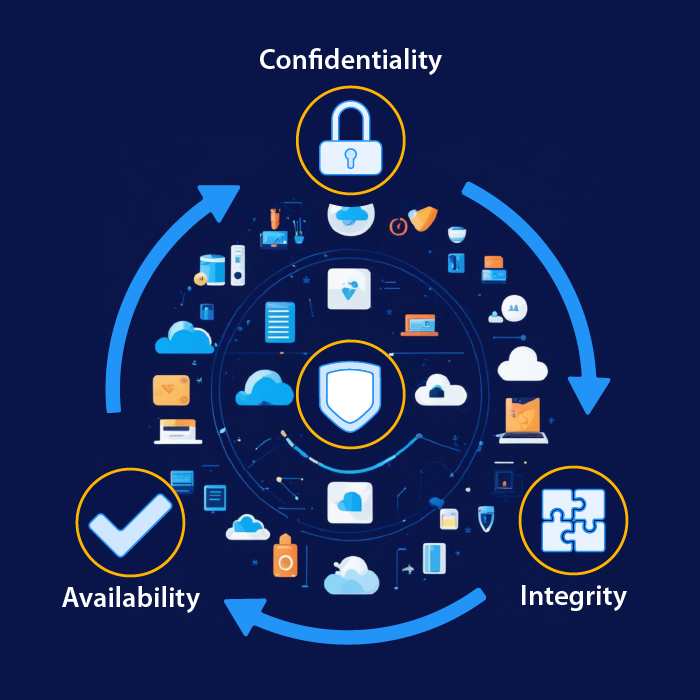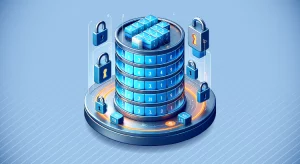
Confidentiality, Integrity, Availability Examples
The CIA triad, consisting of confidentiality, integrity, and availability, is a fundamental framework in information security. These principles guide organizations in protecting sensitive data by ensuring it is secure, accurate, and accessible only to authorized individuals when needed. The triad is central to cybersecurity strategies, helping prioritize resources and define security measures.
One of the most frequently asked questions about this model is: what does availability in the cia triad ensure? In simple terms, it guarantees that authorized users can access systems and data when they need it—whether during routine business operations or unexpected disruptions.
Modern tools like DataSunrise help organizations navigate the evolving threat landscape. This article explores the CIA triad’s definition, practical applications, challenges, and real-life examples to highlight its crucial role in safeguarding data.
Definition of Confidentiality, Integrity, and Availability
What Does Availability in the CIA Triad Ensure?
Availability in the CIA triad ensures that data and services are accessible to authorized users when needed. This includes access during normal operations, high-demand periods, and disaster recovery scenarios. It supports business continuity and operational resilience by minimizing downtime and system failure. In short, availability guarantees reliable access to digital resources at the moment they are required.
The CIA triad is an acronym for Confidentiality, Integrity, and Availability, each representing a fundamental objective of information security.
- Confidentiality ensures that information is accessible only to those authorized to have access, safeguarding personal and sensitive data from unauthorized entities. Achieving confidentiality involves implementing robust security measures such as encryption, access controls, and user authentication. Encryption techniques, such as AES (Advanced Encryption Standard), scramble data into an unreadable format, making it indecipherable to unauthorized users. Access controls restrict access to sensitive data based on user roles, permissions, and authentication mechanisms like passwords, biometrics, or multi-factor authentication.
- Integrity involves maintaining the accuracy and completeness of data, ensuring that information is not altered or tampered with by unauthorized individuals. Integrity involves measures such as data validation, checksums, digital signatures, and audits. Data validation techniques verify the accuracy and consistency of data inputs, ensuring that only valid and authorized information is processed. Checksums generate unique identifiers or hash values for data sets, allowing for verification of data integrity through comparison. Digital signatures verify the authenticity and integrity of digital documents or messages, providing assurance that they have not been altered or tampered with. Conducting regular audits and monitoring to detect and correct any integrity issues. This includes reviewing logs to identify any unauthorized access or modifications.
- Availability ensures that information and resources are accessible to authorized users when needed, underlining the importance of reliable access to data and systems. Businesses ensure availability through redundancy, fault tolerance, and disaster recovery planning. Redundancy involves duplicating critical systems, components, or resources to provide backup in case of failures. Fault tolerance mechanisms, such as load balancing or failover systems, automatically reroute traffic or resources to healthy components to prevent downtime. Disaster recovery plans outline procedures for restoring operations in the event of disruptions, such as cyber attacks, natural disasters, or hardware failures, minimizing the impact on business continuity.

Picture 1. The CIA triad
The CIA triad is important for businesses because it helps them protect sensitive information, preserve trust and reputation, ensure operational continuity, comply with regulations, and gain a competitive advantage. By prioritizing confidentiality, integrity, and availability, businesses can mitigate risks, enhance resilience, and thrive in an increasingly interconnected and data-driven world.
Challenges of Achieving Confidentiality, Integrity, and Availability
Implementing and maintaining the CIA triad poses several challenges for organizations in today’s complex and dynamic cybersecurity landscape. Here they are:
Emerging Threat Landscape. The evolving nature of cyber threats presents significant challenges to the CIA Triad. Malicious actors constantly devise new techniques, such as ransomware attacks, phishing scams, or zero-day exploits, to compromise confidentiality, integrity, or availability. Staying ahead of these threats requires continuous monitoring, threat intelligence, and rapid response capabilities.
Human Factors. Human error remains a significant challenge in upholding the CIA Triad. Despite robust technical safeguards, employees may inadvertently compromise security through actions such as clicking on phishing links, sharing passwords, or mishandling sensitive data. Addressing human factors requires comprehensive training, awareness programs, and a culture of cybersecurity throughout the organization.
Complexity of Systems. Modern IT infrastructures are increasingly complex, with interconnected systems, cloud services, and IoT (Internet of Things) devices. Managing the security of these diverse environments while ensuring the CIA triad goals are met can be daunting. Complexity introduces vulnerabilities and potential points of failure, making it challenging to maintain confidentiality, integrity, and availability across the entire ecosystem.
Regulatory Compliance. Compliance with various regulations and standards, such as GDPR, HIPAA, or PCI DSS, adds another layer of complexity to achieving the CIA Triad. Meeting regulatory requirements often involves implementing specific security controls, conducting regular audits, and maintaining detailed documentation. Failure to comply with regulations can result in legal consequences, fines, or damage to reputation.
Emerging Technologies and the CIA Triad
Emerging technologies both enhance and challenge the CIA triad principles. AI-powered tools detect unusual access patterns quickly. Machine learning algorithms identify potential data integrity violations. Blockchain technology provides tamper-evident data storage. Zero Trust architectures improve confidentiality through continuous verification. Edge computing creates new availability challenges for distributed systems. Quantum computing threatens current encryption standards. DevSecOps practices integrate security throughout development lifecycles. Automated security solutions respond faster than human teams. Cloud-native security controls adapt to dynamic environments. Real-time threat intelligence enhances all three CIA components simultaneously. Organizations must continually evaluate how new technologies impact their security posture.
Examples of Confidentiality, Integrity, and Availability
Confidentiality
In the healthcare sector, the confidentiality of patient records is paramount. Hospitals use encrypted communication channels and secure databases to protect sensitive health information, adhering to regulations like HIPAA in the United States.
Here, DataSunrise’s Dynamic Data Masking and real-time encryption capabilities ensure that sensitive health information is safeguarded. By employing these sophisticated security measures, healthcare providers can ensure compliance with stringent regulations, while protecting patient data from unauthorized access.
Integrity
The banking industry exemplifies the importance of integrity. Financial institutions employ end-to-end encryption and digital signatures to ensure that transactions are secure and unaltered, maintaining the trust of their customers.
DataSunrise’s Database Activity Monitoring provides an additional layer of security. By monitoring and analyzing all database activities in real-time, DataSunrise helps prevent unauthorized or suspicious attempts to alter financial transactions.
Availability
Online retail platforms illustrate the necessity of availability. These businesses implement scalable architectures and disaster recovery plans to handle high traffic volumes and maintain service continuity during peak shopping periods or in the event of technical issues.
This is a real-world example of what availability in the CIA triad ensures: consistent access to systems and data for customers and internal users—even during traffic spikes or infrastructure failures.
DataSunrise’s Database Firewall protects databases from threats that could compromise availability, such as SQL injection attacks. Combined with performance monitoring for early detection of potential issues, DataSunrise helps ensure that online services remain available to customers, supporting business continuity.
Conclusion
The challenges of achieving confidentiality, integrity, and availability are manifold, but the principles encapsulated by the CIA triad remain critical in the quest to protect information in an increasingly digital world. Integrating DataSunrise into the framework of the CIA triad not only highlights the practical applications of confidentiality, integrity, and availability but also illustrates how modern cybersecurity solutions can address the challenges posed by a dynamic threat landscape.
Ultimately, what availability in the CIA triad ensures is that organizations can function without interruption. From real-time customer transactions to critical internal operations, availability plays a vital role in safeguarding uptime and access across IT environments.
Through continuous vigilance, innovation, and adherence to these foundational principles, organizations can navigate the complexities of information security and safeguard their most valuable assets against the myriad threats they face.
